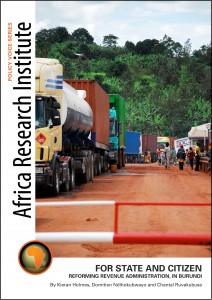Download this Policy Voice in English
Téléchargez ce Policy Voice en français
Tax is high on the agenda in Africa. At an international level, advocacy groups and the G8 have called for greater efforts to counter tax evasion and avoidance by multinational companies. But in many countries in sub-Saharan Africa, a similar – and arguably even more pressing – campaign is being waged to improve the capacity of the state to collect domestic revenues.
In Burundi, the prospects for improving tax administration could not have been more inauspicious. By 2009, following the cessation of a civil war that claimed more than 200,000 lives, Burundi’s GDP per capita was the lowest in the world at US$150. Four-fifths of the population subsisted below the US$1 income per day poverty line. The Transparency International East African Bribery Index listed Burundi as the most corrupt country in the region. The country’s tax department was named as the most corrupt institution.
Despite the signally inhibitive outlook, the government implemented a number of measures to improve financial management. These included the creation of a new semi-autonomous revenue authority – the Office Burundais des Recettes (OBR). In 2012, tax revenues were 75% higher than in 2009 – a 25% increase in real terms. The contribution of tax to GDP had risen from 13.8% in 2009 to 16.7%.
In this Policy Voice, the OBR’s senior management describe in detail how tax collection and administration has been reformed in one of Africa’s poorest nations. Their account highlights the actions taken to reduce corruption, improve services, implement legislative reforms and widen the tax base.
The authors are candid about the difficulties confronting the OBR. Among other things, tax exemptions remain too high and the costs of taxing much of the informal economy outweigh any financial benefit. The establishment, and continued success, of an efficient revenue authority is dependent on a favourable political, business and legislative backdrop.
Tax reform is about more than simply raising revenues for central government. Higher revenue will be essential for the health of the public purse. However, the judicious deployment of public funds will be critical for building a viable democracy in Burundi.







